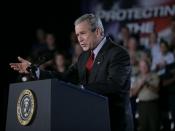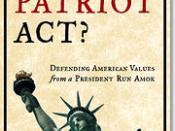The foundations for personal freedom and the mark of an open society is defined in the First Amendment, which protects freedom of speech, press, religion, assembly, and petition. Shortly after the September 11th attacks the Patriot Act was passed in an attempt to secure the nation's safety. This set of new laws has collided with the rights of the citizens. The Patriot Act has been the center of a rigorous controversy around whether or not it violates the Constitution including the First Amendment. One specific aspect of the Patriot Act that collides with the First Amendment is how it eases the ability for the government to conceal information. This secrecy that the Patriot Act gives the government is slowly chipping away at the constitution, specifically at the First Amendment.
BACKGROUNDThe Patriot Act looms around the balance between national security and individual liberty. David L. Hudson Jr. (n.d), a First Amendment research attorney illustrates that supporters believe that "the Patriot Act is responsible for preventing further catastrophes."
Senator Mitch McConnell will go as far to say that the Patriot Act is "the biggest hero to emerge from the hearings before the 9/11 Commissionâ¦" (Hudson, n.d.). George W. Bush also believes that the Patriot Act helped "break up terror cells in Ohio, New York, Oregon, and Virginia" (Hudson, n.d.). Those who are against the Patriot Act "counter that the Patriot Act represents the loss of individual libertyâ¦" (Hudson, n.d.). Robert Levy of the Cato Institute vigorously describes the Patriot Act as a "looming sacrifice of civil liberties at the altar of national security" (Hudson, n.d.).
Congress overwhelmingly passed the Patriot Act after the terrorist attacks. This massive law amends several federal laws in order to ease the gathering of intelligence and surveillance on suspected terrorists and groups. The act permits the use...


